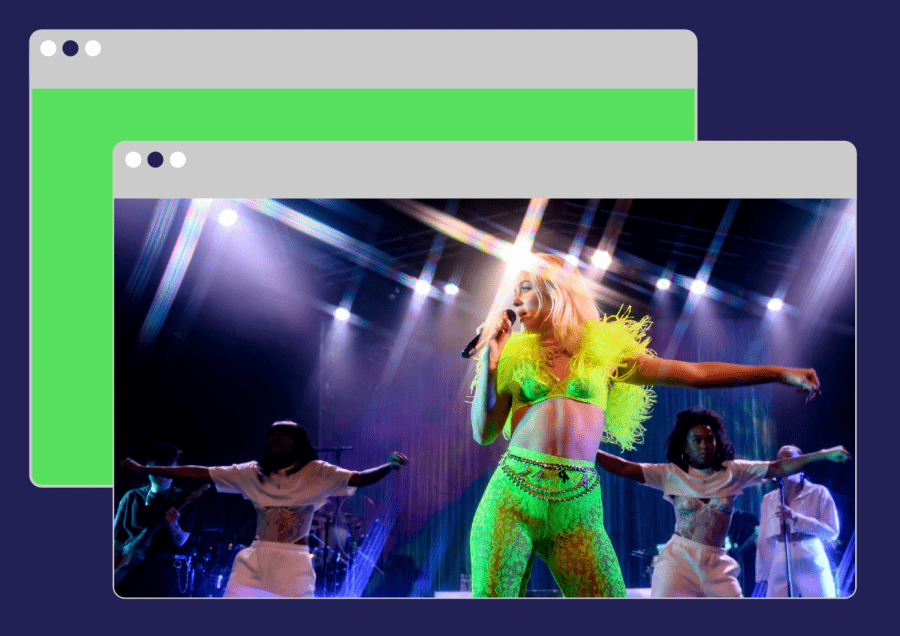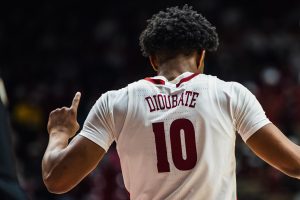Opinion | Livestreamed concerts won’t go away when COVID does. Here’s why
The almighty dollar might have something to do with it.
Zara Larsson is one of many artists leaning into remote concerts. Photo courtesy of Wikimedia Commons
April 8, 2021
The Woodstock debut of legendary guitarist Jimi Hendrix and Freddie Mercury’s career-defining Live Aid performance are just two of many moments when live music moments were immortalized as foundational texts for pop culture. Concerts are increasingly rare snapshots in time when people put aside their differences to experience a moment of mutual excitement and admiration together. Those moments define generations and give voice to youth culture.
But like many social aspects of our culture, the future of live music became uncertain after the COVID-19 outbreak in early 2020.
The entertainment industry was left struggling after a summer of concerts, Broadway shows and music festivals were cancelled due to the pandemic.
Artists such as Taylor Swift, 5 Seconds of Summer and Childish Gambino continued to make music during quarantine, though many fans were disappointed to find that none of these albums would get to be toured due to public safety guidelines. For a while, music was restricted to streaming platforms like Spotify or Apple Music. This was the norm for most of 2020—before livestreamed concerts slotted themselves into many media diets.
Virtual concerts have technically been around as early as 1966, mainly in the form of televised performances on variety shows like “The Ed Sullivan Show” and “Top of the Pops.” New technology combined with the force of social media has led to the speedy evolution of an entirely new and immersive experience.
Endlessly refreshing a Ticketmaster page in an attempt to get floor seats won’t get you anywhere now. There’s no Uber surge pricing to avoid on the way to the venue. Anyone who pays for what is usually a one-time-only show can watch the livestreamed concert from their couch, in their bed, outside or even at work.
While the idea of livestreamed concerts is a new concept for most, people like K-pop fans are no strangers to cozying up on their couches and attending virtual concerts that are being performed and streamed from several time zones away.
The livestreaming phenomenon has allowed artists to bring joy to their fans in a safe way during the pandemic, but it has also kept musicians afloat. Few artists ever get lucky enough to make the same figures as Justin Bieber or Ariana Grande, meaning they predominantly rely on ticket sales, album sales and stream counts on Spotify and Apple Music for revenue.
Data analysts in the music industry recently measured the amount of revenue generated by livestreamed concerts in 2020. According to the analysts, the cumulative amount of ticket sales and merch sales amassed over $600 million dollars, clearly a potential cash grab for artists and top record labels alike. With that kind of money being brought in, livestreamed concerts seem to be here to stay, whether fans like it or not.
For many artists, some of whom are just dropping their debut albums, the desire to get exposure from live performances using any means available to them often trumps the fact that they probably won’t be performing in front of a crowd. Madison Beer, John Legend, Miley Cyrus and Diplo are all titanic artists who have hopped on the virtual concert bandwagon in the past year, effectively hammering the concept into the mainstream.
While there is clear profit from livestreamed concerts on the music industry’s end, the availability of live performances on other social media platforms lead many to question whether charging over $20 for a ticket to a virtual concert is honest or even worth it.
Ticket prices to live, in-person events usually exceed $100, a number that has continually been on the rise due to ticket scalpers looking to mass-purchase and then sell in order to make a profit. VIP packages and meet and greets often total a hefty sum of $900 or more.
Still, most people with a disposable income don’t bat an eye at putting down tons of money to see their favorite singer in real life.
Buying exclusive merchandise at merch stands, catching guitar picks or drumsticks from the band members and even the rare chance to be recognized in the crowd by an idol are all things that make a concert experience worth the steep price.
JayciLynn Conger, a freshman majoring in marketing, said it’s unfair to charge fans when they’re missing out on all the live aspects of a concert, which are arguably the most special.
“It’s definitely a scam,” Conger said. “We are already having financial problems due to COVID-19 and now musicians are trying to make a quick buck for streaming a concert online. You pay for the experience and excitement, not just the music.”
While many fans are more than willing to support their favorite artists in exchange for a live show performed in their bedroom, others see charging people for a virtual concert as robbery, since many of the shows involve older songs that have already been recorded and put on Youtube for free.
Fans of all ages and artists have taken to social media platforms like Twitter to express their distaste over the spike in virtual concerts during the pandemic.
“The biggest scam during quarantine is having to ‘buy tickets’ for a virtual concert,” one fan wrote.
Another called out indie band Hippo Campus, criticizing the band for charging fans to watch a concert that only lasted for 36 minutes.
“Why did I just pay 50 cents per minute for the Hippo Campus virtual concert? Like I want to support you guys, but why did you kind of scam us?” the fan said.
Despite calls from fans for artists to provide a cheaper or even free virtual concert experience, the ticket pricing usually isn’t up to the artists themselves.
An artist’s resources, popularity and even their label all play a large role in determining the price point for the virtual tickets. Artists like Ariana Grande probably wouldn’t lose much money over putting on a concert for free based on her bottomless supply of royalties and resources.
Considering that the average price for a ticket to an Ariana Grande concert in-person is $255, even just one sold-out arena show could give Grande more than enough money to supplement an entirely free virtual experience for her fans.
Even though Grande’s team and management could theoretically foot the bill, they would be losing out on a huge profit, hence why few artists ever perform for free.
Alternative rock band Waterparks, however, is much smaller.
The Dallas-based band charged $20 for their one-time-only, non-rewatchable concert on March 27 for their new album, “Greatest Hits.”
It may seem shocking that a relatively-unknown band charged more than Grammy Award-winning singer Dua Lipa did at her own livestreamed concert in November. But the sad fact is that bands with smaller followings typically rely heavily on merch revenue and ticket sales not only to make a profit, but to break even so they can pay for more time in the studio.
It is logical that smaller bands with less resources are taking advantage of the opportunity to both make fans happy while providing themselves with a steady income. Despite the fact that some artists simply don’t have the resources or budget to put on free concerts, especially with recent financial difficulties due to the pandemic, music-lovers still feel like these virtual concerts only benefit the artists, not the fans.
“I’m all for musicians being paid for their work, but I think charging people for virtual concerts during this time might be a little much considering it’s basically like watching a YouTube video.” said Meghan Kalenborn, a freshman majoring in news and sports media.
While some are unhappy that many artists are scamming their fans to make a profit, not all artists are keeping the money that they earn from these shows. In fact, many musicians who are charging people to see the performances are using the ticket earnings to donate to charity.
SB19, a Philippines-based boy band, donated all the earnings from their virtual concert in November to provide relief for South Asia’s recent weather disasters.
Liam Payne, former member One Direction, worked with streaming platform Veeps to live stream a concert this summer. The proceeds went to The Trussell Trust, an NGO that is responsible for helping over 1,000 food banks across the United Kingdom. The Trussell Trust later reported that Payne’s donation was enough to provide 360,000 meals to people struggling during the COVID crisis.
With an abundance of vaccines on the horizon, music lovers are hopeful that live concerts will return soon. While the excitement of musicians confirming their summer tour dates is promising, plenty of artists are continuing to put on virtual concerts in 2021.
Dean Lewis, Ashnikko and Weezer are just a handful of artists who will be doing livestreamed performances this April, making it clear that the trend of virtual concerts will not be left behind in 2020.
While technological advancements have allowed the general public to enjoy some sort of live performance from their favorite artist over the past year, nothing will replace truly being there in the moment and soaking up the entire live experience.
Maddy Reda is a contributing writer for the culture desk and a freshman studying public relations. Her column appears periodically.





















